致用英语听力(第三版)unit 1 Greetings and Introductions
- 格式:ppt
- 大小:12.26 MB
- 文档页数:35

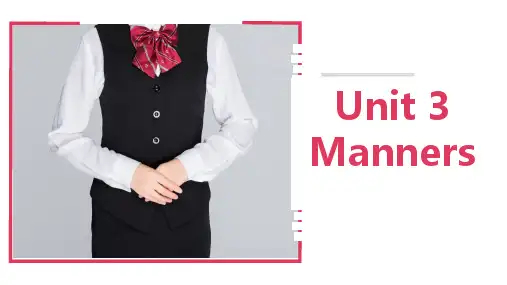
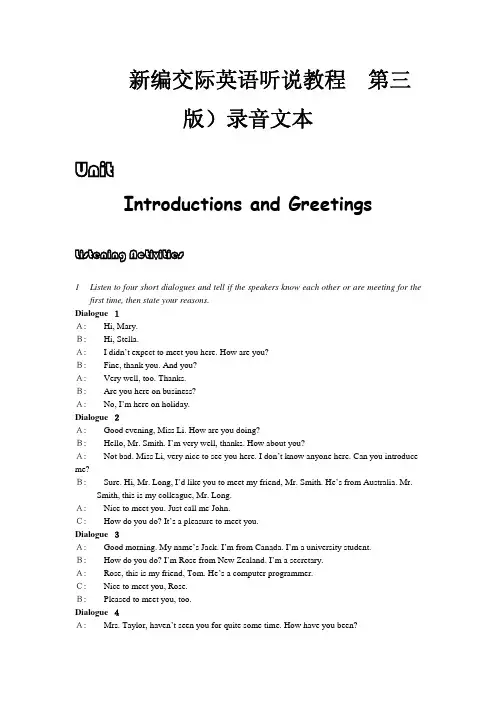
新编交际英语听说教程(第三版)录音文本Unit 1Introductions and Greetings Listening Activities1Listen to four short dialogues and tell if the speakers know each other or are meeting for the first time, then state your reasons.Dialogue 1A: Hi, Mary.B: Hi, Stella.A: I didn’t expect to meet you here. How are you?B: Fine, thank you. And you?A: Very well, too. Thanks.B: Are you here on business?A: No, I’m here on holiday.Dialogue 2A: Good evening, Miss Li. How are you doing?B: Hello, Mr. Smith. I’m very well, thanks. How about you?A: Not bad. Miss Li, very nice to see you here. I don’t know anyone here. Can you introduce me?B: Sure. Hi, Mr. Long, I’d like you to meet my friend, Mr. Smith. He’s from Australia. Mr.Smith, this is my colleague, Mr. Long.A: Nice to meet you. Just call me John.C: How do you do? It’s a pleasure to meet you.Dialogue 3A: Good morning. My name’s Jack. I’m from Canada. I’m a university student.B: How do you do? I’m Rose from New Zealand. I’m a secretary.A: Rose, this is my friend, Tom. He’s a computer programmer.C: Nice to meet you, Rose.B: Pleased to meet you, too.Dialogue 4A: Mrs. Taylor, haven’t seen you for quite some time. How have you been?B: Fine, thanks. How about you, Mr. Shaw?A: Not very well. I’ve got a backache.B: Sorry to hear that. I hope you’ll be well soon.A: Thank you.2. Listen to three dialogues and tell where they take place.Dialogue 1A: Good morning. I’m Helen Brookes. I’d like to see your Personnel Manager, Mr. Gore. B: Good morning, Miss Brookes. Have you got an appointment with him?A: Yes.B: Please wait a minute. I’ll phone him and see if he’s there.A: OK.C: Hello.B: Hello, Mr. Gore. A Miss Brookes is here. She wants to see you.C: Ask her to come to my office. Thank you.B: Miss Brookes, Mr. Gore is expecting you in his office. Mr. Gore’s office is on the fifth floor, the second room on the right when you get out of the elevator. The elevator is over there.A: Thank you.B: Don’t mention it.Dialogue 2A: Excuse me, are you Miss Davies from Britain?B: Yes, I am. You’re...A: I’m Chen Hong from the Office of Foreign Affairs, Zhongshan University. I’m here to meet you.B: How do you do, Mr. Chen? Thank you for coming to meet me.A: You’re welcome. Miss Davis, did you have a good flight?B: I’m afraid not. I get jet lag whenever I travel to Asia from Britain.A: I’m sorry to hear that. Let me help you with your luggage.B: Oh, thank you. It’s very kind of you.Dialogue 3A: It seems I haven’t met you before. Are you new here?B: Yes. My name is Mary.A: I’m Robert. Pleased to meet you.B: Pleased to meet you, too.A: I’m glad we have a new colleague.B: It’s nice to have a chance to work with you.Practice for Consolidation1.Listening PracticeListen to the following two dialogues and complete the sentences.Dialogue 1A: Good morning, Lily. I didn’t expect to see you here in Guangzhou.How have you been lately?B: Pretty good, thank you. How about you?A: Not bad. Thanks.B: Janet, you don’t look very well.A: I’m feeling a bit unwell. I’ve got a slight cold.B: I’m sorry to hear that. Is it because of the bad weather here?A: I think so. It has been humid and foggy for the past few days.B: The weather in this season in Guangzhou always stays like this. People from other places find it hard to get used to this kind of weather. Anyway, Ihope you take good care of yourself and will be well soon.A: Thank you for your concern. Lily, why are you in Guangzhou?B: I’m now working here. I’m with Adidas, Guangzhou Office. How about you?A: We’re here to attend the trade fair. Lily, I’d like you to meet my colleague, Henry. Henry, this is my old friend, Lily.B: How do you do? Pleased to meet you.C: Nice to meet you, too. I hope you’re enjoying your stay in Guangzhou.Dialogue 2A: Excuse me, are you Mr. Morris from the United States?B: No, I’m not.A: Sorry, my mistake.B: That’s OK.A: Excuse me, you must be Mr. Morris from the United States.C: Yes, I am. You are...A: I’m Li Fang, secretary of Mr. Liu, who is too busy to be here to meet you in person. C: Miss Li, thank you for coming to meet me at the station.A: You’re welcome. Mr. Morris, did you have a good journey?C: Yes, very well. The train traveled very smoothly.A: Is this your first visit to China?C: Yes, it is. But I’ve heard a lot about China. It’s reported in newspapers that great changes have taken place in China. I’d like to see these changes with my own eyes.A: I hope you’ll have a good time in China.C: Thank you.A: Would you like me to carry this suitcase for you?C: Thank you. It’s very kind of you.A: Shall we go now? We’ll take a taxi outside.C: All right.。
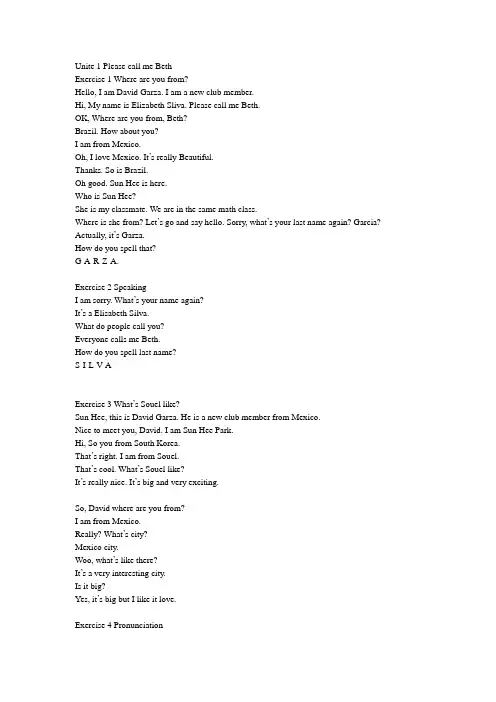
Unite 1 Please call me BethExercise 1 Where are you from?Hello, I am David Garza. I am a new club member.Hi, My name is Elizabeth Sliva. Please call me Beth.OK, Where are you from, Beth?Brazil. How about you?I am from Mexico.Oh, I love Mexico. It’s really Beautiful.Thanks. So is Brazil.Oh good. Sun Hee is here.Who is Sun Hee?She is my classmate. We are in the same math class.Where is she from? Let’s go and say hello. Sorry, what’s your last name again? Garcia? Actually, it’s Garza.How do you spell that?G-A-R-Z-A.Exercise 2 SpeakingI am sorry. What’s your name again?It’s a Elisabeth Silva.What do people call you?Everyone calls me Beth.How do you spell last name?S-I-L-V-AExercise 3 What’s Souel like?Sun Hee, this is David Garza. He is a new club member from Mexico.Nice to meet you, David. I am Sun Hee Park.Hi, So you from South Korea.That’s right. I am from Souel.That’s cool. What’s Souel like?It’s really nice. It’s big and very exciting.So, David where are you from?I am from Mexico.Really? What’s city?Mexico city.Woo, what’s like there?It’s a very interesting city.Is it big?Yes, it’s big but I like it love.Exercise 4 PronunciationI am a new club member.Sun Hee is over there.My name is Elisabeth Silva.Excerise 5 Grammer focusI am from Mexico. You are from Brazil. He is from Japan.She is a new club member.It’s an exciting city.We are in the same class.They are my classmates.I’m=I am you’re=you are he’s=he is she’s=she is it’s=it is we’re=we are there’re=there areWh-questions with beWhat’s your name? My name is Beth.Where’s your friend? He is in class.Who’s Sun Hee? She is my classmate.What are your classmates like? They are very nice.Where are you and Loise from? We are from Brazil.How are your classes? They are really interesting.Exercise 7 How’s it going?Hi, David, how’s it going?Fine, thanks. How are you?Pretty good. So are your classes interesting this semester?Yes, they are. I really love chemistry.Chemistry? Are you and Beth in the same class?No, we are n’t. My class is in the morning. Her class is in the afternoon.Listen, I am on my way to the cafeteria now. Are you free?Sure, Let’s go.Exercise 8 Grammer FocusYes-No questions and showed answers with beAre you free? Yes, I am. No, I am not.Is David from Mexico? Yes he is. No he is not. No, he isn’t.Is that class in the morning? Yes, it is. No, it is not. No, it isn’t.Are you and Beth in the same class? Yes We are. No, we aren’t. No, we are not.Are classes interesting? Yes, they are. No, they are not. No, they aren’t.Exercise 10 Lestening What’s your last name again?John, this is my Friend Linda Tanaka. We are in the same English class.Hi Linda, I am Johnsonful Miller. Everyone calls me John.Nice to meet you, John. And what’s your last name again?It’s Miller. M-I-L-L-E-R.Where are you from, John?I am from here, United States. Actually Chicago. How do you like Chicago.I love it. It’s my favourite city.。

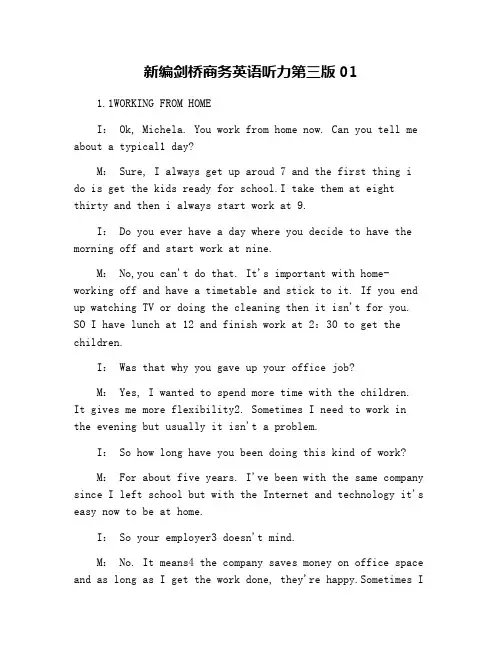
新编剑桥商务英语听力第三版011.1WORKING FROM HOMEI: Ok, Michela. You work from home now. Can you tell me about a typical1 day?M: Sure, I always get up aroud 7 and the first thing i do is get the kids ready for school.I take them at eight thirty and then i always start work at 9.I: Do you ever have a day where you decide to have the morning off and start work at nine.M: No,you can't do that. It's important with home-working off and have a timetable and stick to it. If you end up watching TV or doing the cleaning then it isn't for you. SO I have lunch at 12 and finish work at 2:30 to get the children.I: Was that why you gave up your office job?M: Yes, I wanted to spend more time with the children.It gives me more flexibility2. Sometimes I need to work in the evening but usually it isn't a problem.I: So how long have you been doing this kind of work?M: For about five years. I've been with the same company since I left school but with the Internet and technology it's easy now to be at home.I: So your employer3 doesn't mind.M: No. It means4 the company saves money on office space and as long as I get the work done, they're happy.Sometimes Istill go into work to meet clients5 and so on. For example, I'M going in nearly every day this week because we have visitors from another company and I can't really invite them overto my house. Besides, it's nice to go in every so often.I like to see people and catch up on the gossip6 and the news with my colleagues7. I miss that side of going into work every day.I: is there anything else you miss?M:ERMM,no, not really. And I'll tell you what I really don't miss and that's having to spend 2 hours commuting on the bus and train every day点击收听单词发音收听单词发音1 typical 5ltwoadj.典型的,象征的,有代表性的参考例句:This is typical Chinese English.这是典型的中式英语。
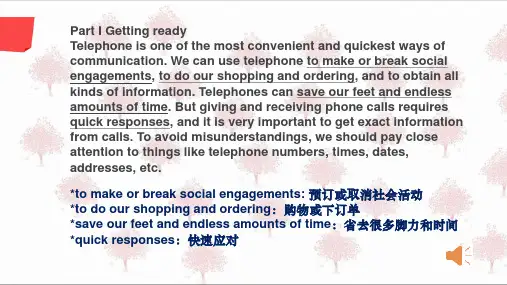
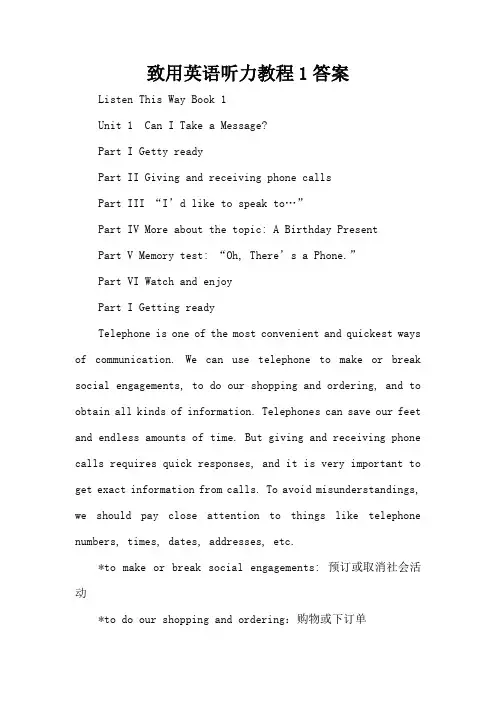
致用英语听力教程1答案Listen This Way Book 1Unit 1 Can I Take a Message?Part I Getty readyPart II Giving and receiving phone callsPart III “I’d like to speak to…”Part IV More about the topic: A Birthday PresentPart V Memory test: “Oh, There’s a Phone.”Part VI Watch and enjoyPart I Getting readyTelephone is one of the most convenient and quickest ways of communication. We can use telephone to make or break social engagements, to do our shopping and ordering, and to obtain all kinds of information. Telephones can save our feet and endless amounts of time. But giving and receiving phone calls requires quick responses, and it is very important to get exact information from calls. To avoid misunderstandings, we should pay close attention to things like telephone numbers, times, dates, addresses, etc.*to make or break social engagements: 预订或取消社会活动*to do our shopping and ordering:购物或下订单*save our feet and endless amounts of time:省去很多脚力和时间*quick responses:快速应对A. The following words and phrases will appear in this unit. All of them are related to the telephone and some are frequently used when giving and receiving phone calls. Listen carefully and study the definitions.1.disconnected: 停机2.an unpublished number: 非公开号码3.answering machine: 电话答录机4.put through: 接通(电话)5.extension: 分机6.switchboard: 总机7.calculator: 计算器(有些计算器带储存电话号码的功能)8.telephone directory: 电话号码簿9.operator: 接线员10.hang up: 挂机rmation: 问询台12.exchange: 电话局B. Listen to part of a telephone conversation. Then choose the best response for each.1. a. Mr. Rodgers, please. b. I’ll call this afternoon. c. This is Samuel Peterson.2. a. Okay. I’ll call him right now. b. I’ll call him after lunch. c. Okay. Lunch time is fine.3.a. Yes. It’s 5345-4826 b. My name’s Craig Rice.c. My zip code is 200045.4.a. No. I'll call later. b. Yes. Go ahead. c.Yes. Please give me the message.5.a. I work for Tony. b. It’s spelled T-O-N-Y.c. That’s correct.6.a. Here’s the message. b. No. I’ll call later.c. Thank you.7.a. Okay. I’ll call her back later. b. Yes. I’ll meet her at 5:00. c. Sorry. I can’t meet her now.8.a. I’ll call him Monday morning. b. Allright. Please tell him Chris called.c. Have him call me on Monday at 9:00 a.m.9.a. Next Friday would be fine. b. Sorry. I’m busyon Wednesday at 6:00 p.m.c. Sure. No problem.10.a. Yes. I’ll call her later. b.No. Just tell herI called. C. Yes. Tomorrow is fine.C. Here are some short conversations on the phone. Please listenPay special attention to telephone numbers and addresses. Supply the missing words.1. Woman: Hello. Man: Hello. I want the County _________Woman: That’s_______. Man: Th ank you.2. Woman: Hello. Girl: ___________________, please.Woman: _________. Girl: What? Woman: I said _________. Girl: OK. Thank you.3. Woman: My husband’s broken his leg.Man: What’s your phone_________?Woman: Call just ______. The address is _____ Modern ______.Man: The _________ will be there in a few minutes.*ambulance: 救护车*in a few/five minutes: 几/五分钟之后,不是几/五分钟之内4. Woman: Hello, I’d like a______. Man: Yes? What is the _________?Woman: _____ Heath Road, Hamstit. Man: Oh, OK. The taxi will be there _________.Woman: Thank you.5.Man 1: Hello, I want a _____. Man 2: OK. What _______ is it?Man 1: _____ East ______ Street.Man 2: Ri ght*cab = taxi *avenue: 大街、大道*fire brigade:消防队6.Man: My house is on _____. Woman: Where do you _____? Man: ___ Alluson _______, Winderlon. Woman: Don’t _____. A fire ______ will be there in _____ minutes.7. Woman: Someone’s stolen my _____. Girl: Where are you calling _____?Woman: The Newton ______. Girl: The _______ will soon be there.Part II Giving and receiving phone callsMost of the time, when you dial a telephone number, your call goes through with no problem. Sometimes, however, you are not able to get through and the reason is given by a recorded message.*dial a telephone number: 拨打一个电话号码*a recorded message: 电话录音A. You are going to hear some recordings that the telephone company uses to tell you why your call did not go through. Listen carefully and write down all the telephone numbers you hear and the reasons why the calls did not go through.Sometimes even when a telephone call goes through, the caller is still unable to speak to the person being called. Instead, the call might be answered by a machine. An answering machine answers calls with a tape recording, and many answering machines also allow the caller to record a message. It’s more efficient to leave your name and telephone number than to waste your time calling again and again.*a tape recording: 主人预录在电话答录机上的话*to record a message: 客人在电话答录机上留言B. . You are going to hear several calls that are answered by machines. Listen to the recorded messages. Write down the reasons why each call is being answered by a machine instead of a person and the actions you decide to take. Write “W” for “wait on the line”, “L” for “leave a message”, and “C” for “call back later”.People usually receive telephone calls unexpectedly. Sometimes they have to make a note of the information contained in the call — particularly when the call is for someone else. Message taking is one of the most useful skills in dealing with telephone calls. A great deal of practice is needed in this respect.*message taking: 信息记录C1. You are going to hear some recorded phone calls. While listening for the first time, add more key words if you can in the left-hand column. After the second listening,complete the messages in the right-hand column with the help of the notes.。

Unite 1 Please call me BethExercise 1 Where are you from?Hello, I am David Garza. I am a new club member.Hi, My name is Elizabeth Sliva. Please call me Beth.OK, Where are you from, Beth?Brazil. How about you?I am from Mexico.Oh, I love Mexico. It’s really Beautiful.Thanks. So is Brazil.Oh good. Sun Hee is here.Who is Sun Hee?She is my classmate. We are in the same math class.Where is she from? Let’s go and say hello. Sorry, what’s your last name again? Garcia? Actually, it’s Garza.How do you spell that?G-A-R-Z-A.Exercise 2 SpeakingI am sorry. What’s your name again?It’s a Elisabeth Silva.What do people call you?Everyone calls me Beth.How do you spell last name?S-I-L-V-AExercise 3 What’s Souel like?Sun Hee, this is David Garza. He is a new club member from Mexico.Nice to meet you, David. I am Sun Hee Park.Hi, So you from South Korea.That’s right. I am from Souel.That’s cool. What’s Souel like?It’s really nice. It’s big and very exciting.So, David where are you from?I am from Mexico.Really? What’s city?Mexico city.Woo, what’s like there?It’s a very interesting city.Is it big?Yes, it’s big but I like it love.Exercise 4 PronunciationI am a new club member.Sun Hee is over there.My name is Elisabeth Silva.Excerise 5 Grammer focusI am from Mexico. You are from Brazil. He is from Japan.She is a new club member.It’s an exciting city.We are in the same class.They are my classmates.I’m=I am you’re=you are he’s=he is she’s=she is it’s=it is we’re=we are there’re=there areWh-questions with beWhat’s your name? My name is Beth.Where’s your friend? He is in class.Who’s Sun Hee? She is my classmate.What are your classmates like? They are very nice.Where are you and Loise from? We are from Brazil.How are your classes? They are really interesting.Exercise 7 How’s it going?Hi, David, how’s it going?Fine, thanks. How are you?Pretty good. So are your classes interesting this semester?Yes, they are. I really love chemistry.Chemistry? Are you and Beth in the same class?No, we are n’t. My class is in the morning. Her class is in the afternoon.Listen, I am on my way to the cafeteria now. Are you free?Sure, Let’s go.Exercise 8 Grammer FocusYes-No questions and showed answers with beAre you free? Yes, I am. No, I am not.Is David from Mexico? Yes he is. No he is not. No, he isn’t.Is that class in the morning? Yes, it is. No, it is not. No, it isn’t.Are you and Beth in the same class? Yes We are. No, we aren’t. No, we are not.Are classes interesting? Yes, they are. No, they are not. No, they aren’t.Exercise 10 Lestening What’s your last name again?John, this is my Friend Linda Tanaka. We are in the same English class.Hi Linda, I am Johnsonful Miller. Everyone calls me John.Nice to meet you, John. And what’s your last name again?It’s Miller. M-I-L-L-E-R.Where are you from, John?I am from here, United States. Actually Chicago. How do you like Chicago.I love it. It’s my favourite city.。

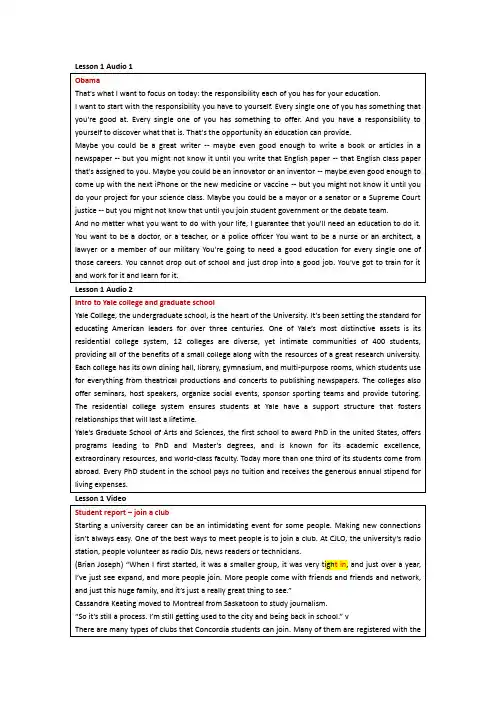
英语听力教程第三版1答案The answer to the English Listening Tutorial 3rd Edition, Part 1Listening skills are essential for effective communication in English. In the English Listening Tutorial 3rd Edition, Part 1, students are introduced to various listening exercises and listening strategies. This section focuses on improving students' ability to understand spoken English in different contexts.Exercise 1 - Multiple Choice Questions1. The main topic of the passage is:A. The importance of listening skills.B. Different listening strategies.C. How to improve listening comprehension.Answer: A. The importance of listening skills.2. The speaker mentions that listening skills are important because:A. They help in understanding spoken English.B. They enhance overall communication skills.C. They are necessary for academic success.Answer: B. They enhance overall communication skills.3. The speaker suggests that students should:A. Practice listening in different situations.B. Focus on understanding new vocabulary.C. Listen to native English speakers only.Answer: A. Practice listening in different situations.Exercise 2 - Fill in the Blanks1. The speaker mentions that listening is an active process because listeners need to ____________.Answer: Pay attention and actively engage with the speaker.2. The speaker emphasizes the importance of _____________ while listening.Answer: Understanding the main ideas and key details.3. The speaker suggests that students should ___________ to improve their listening skills.Answer: Practice listening regularly.Exercise 3 - True or False1. Effective listeners need to focus on understanding every single word.Answer: False. Effective listeners focus on understanding the main ideas and key details, not every single word.2. Listening in different situations is not necessary to improve listening skills.Answer: False. Listening in different situations helps improve listening skills.3. It is not important to pay attention while listening.Answer: False. Paying attention is vital for effective listening. Exercise 4 - Short Answer Questions1. Name three strategies mentioned by the speaker to improve listening skills.Answer: The three strategies mentioned by the speaker are active engagement, understanding main ideas and key details, and regular practice.2. Why is listening an essential skill for effective communication in English?Answer: Listening is an essential skill for effective communication in English because it allows us to understand others, respond appropriately, and engage in meaningful conversations.3. How can students practice listening in different situations? Answer: Students can practice listening in different situations by listening to various types of English media, such as movies, TVshows, podcasts, and music. They can also engage in conversations with native English speakers or participate in language exchange programs.Overall, the English Listening Tutorial 3rd Edition, Part 1 provides students with valuable information and strategies to improve their listening skills. By actively engaging, understanding main ideas, and regularly practicing, students will be able to enhance their overall communication skills in English.。
Unite 1 Please call me BethExercise 1 Where are you from?Hello, I am David Garza. I am a new club member.Hi, My name is Elizabeth Sliva. Please call me Beth.OK, Where are you from, Beth?Brazil. How about you?I am from Mexico.Oh, I love Mexico. It’s really Beautiful.Thanks. So is Brazil.Oh good. Sun Hee is here.Who is Sun Hee?She is my classmate. We are in the same math class.Where is she from? Let’s go and say hello. Sorry, what’s your last name again? Garcia? Actually, it’s Garza.How do you spell that?G-A-R-Z-A.Exercise 2 SpeakingI am sorry. What’s your name again?It’s a Elisabeth Silva.What do people call you?Everyone calls me Beth.How do you spell last name?S-I-L-V-AExercise 3 What’s Souel like?Sun Hee, this is David Garza. He is a new club member from Mexico.Nice to meet you, David. I am Sun Hee Park.Hi, So you from South Korea.That’s right. I am from Souel.That’s cool. What’s Souel like?It’s really nice. It’s big and very exciting.So, David where are you from?I am from Mexico.Really? What’s city?Mexico city.Woo, what’s like there?It’s a very interesting city.Is it big?Yes, it’s big but I like it love.Exercise 4 PronunciationI am a new club member.Sun Hee is over there.My name is Elisabeth Silva.Excerise 5 Grammer focusI am from Mexico. You are from Brazil. He is from Japan.She is a new club member.It’s an exciting city.We are in the same class.They are my classmates.I’m=I am you’re=you are he’s=he is she’s=she is it’s=it is we’re=we are there’re=there areWh-questions with beWhat’s your name? My name is Beth.Where’s your friend? He is in class.Who’s Sun Hee? She is my classmate.What are your classmates like? They are very nice.Where are you and Loise from? We are from Brazil.How are your classes? They are really interesting.Exercise 7 How’s it going?Hi, David, how’s it going?Fine, thanks. How are you?Pretty good. So are your classes interesting this semester?Yes, they are. I really love chemistry.Chemistry? Are you and Beth in the same class?No, we are n’t. My class is in the morning. Her class is in the afternoon.Listen, I am on my way to the cafeteria now. Are you free?Sure, Let’s go.Exercise 8 Grammer FocusYes-No questions and showed answers with beAre you free? Yes, I am. No, I am not.Is David from Mexico? Yes he is. No he is not. No, he isn’t.Is that class in the morning? Yes, it is. No, it is not. No, it isn’t.Are you and Beth in the same class? Yes We are. No, we aren’t. No, we are not.Are classes interesting? Yes, they are. No, they are not. No, they aren’t.Exercise 10 Lestening What’s your last name again?John, this is my Friend Linda Tanaka. We are in the same English class.Hi Linda, I am Johnsonful Miller. Everyone calls me John.Nice to meet you, John. And what’s your last name again?It’s Miller. M-I-L-L-E-R.Where are you from, John?I am from here, United States. Actually Chicago. How do you like Chicago.I love it. It’s my favourite city.。
Unit 1Section One Tactics for ListeningPart 1 PhoneticsStress, Intonation and AccentScriptA.Listen and choose the correct answer to complete each of the following sentences.Pay special attention to the stressed word or digit. What does the speaker want to say?1. We haven’t got any in dark blue.2. We can’t make it at nine tomorrow.3. My telephone number is not 65031609.4. I don’t like the black jumper.5. He won’t come by the 7:30 train.Key1. A (In this sentence “dark” is stressed, indicati ng that they may have something inother colours.)2. B (In this sentence “tomorrow” is stressed, indicating it is an inconvenient day.)3. A (In this sentence “0” is stressed, indicating it is a wrong digit.)4. B (In this sentence “jumper” is stressed, i ndicating what the speaker dislikes is not thecolour but the article.)5. B (In this sentence “train” is stressed, indic ating the visitor will come by a differentmeans of transportation.)Part 2 Listening and Note-TakingDriving CarefullyScriptA. Listen to some sentences and fill in the blanks with the missing words.1. Drive carefully and slowly when pedestrian s are about.2. Three out of four pedestrians killed are either under fifteen or over sixty.3. Be careful near a parked ice-cream van — children are more interested in ice-creamthan in traffic.4. When coming to a zebra crossing, be ready to slow down or stop to let people cross.5. You must give way once they have stepped onto a crossing.B.Now listen to the passage and take notes. After that, use the information from yournotes to complete the outline.Drive carefully and slowly when pedestrians are about, particularly in crowded shopping streets, when you see a bus stop, or near a parked mobile shop. Watch out for pedestrians coming from behind parked or stopped vehicles, or from other places where you might not be able to see them.Three out of four pedestrians killed or seriously injured are either under fifteen or over sixty. The young and the elderly may not judge speeds very well, and may step into the road when you do not expect them. Give them, and the infirm, or blind, or disabled people, plenty of time to cross the road.Drive slowly near schools, and look out for children getting on or off school buses. Stop when signal led to do so by a school crossing patrol showing a Stop-Children sign. Be careful near a parked ice-cream van — children are more interested in ice-cream than in traffic.When coming to a zebra crossing, be ready to slow down or stop to let people cross. You must give way once they have stepped onto a crossing. Signal to other drivers that you mean to slow down or stop. Give yourself more time to slow down or stop on wet or icy roads.Never overtake just before a zebra crossing.KeyA. 1. Drive carefully and slowly when pedestrians are about.2. Three out of four pedestrians killed are either under fifteen or over sixty.3. Be careful near a parked ice-cream van— children are more interested in ice-creamthan in traffic.4. When coming to a zebra crossing, be ready to slow down or stop to let people cross.5. You must give way once they have stepped onto a crossing.B. Driving CarefullyI. Look out for pedestriansA. Drive carefully at crowded shopping streets.B. Drive carefully near a bus stop.C. Drive carefully near a parked mobile shop.II. Look out for the young, the old and the disabledA. Three out of four pedestrians killed or seriously injured are either under fifteen orover sixty.B. The young and the elderly may not judge speeds very well.C. Give them, and the infirm, or blind, or disabled people, plenty of time to cross theroad.III. Look out for childrenA. Stop at a Stop — Children sign.B. Drive slowly near a parked ice-cream van.IV. Coming to a zebra crossingA. Slow down or stop to let people cross.B. Signal to other drivers that you mean to slow down or stop.C. Never overtake just before a zebra crossing.Section Two Listening ComprehensionPart 1 Sentence IdentificationScriptIdentify each sentence as simple (S), compound (CP), complex (CPL) or compound-complex (C-C). You will hear each sentence twice. Write the corresponding letter(s) in the space provided.1. I expect to get the contract, and I will do the best work I can.2. Stanley is aware of your objections, for he has seen your notes about his proposal tothe board.3. Sophia and William decorated the room, replaced the furniture and cleaned the carpet.4. The cover of the manhole he pointed out has clearly been moved since the stormended.5. Jane said she was ill, yet I saw her in the street just now.Key1. C-C2. CP3. S4. CPL5. C-CPart 2 DialoguesDialogue 1 Making ArrangementsScriptA.Tessa is going to have a party. She asks her parents to prepare things for her. Listento the dialogue, tick the right box and fill in the relevant information.Mum: Hello.Tessa: Hi, Mum. It’s me. How are you?Mum: Oh, I’m fine, Tessa. I expect you’re phoning to find out how the arrangement s for your party are going?Tessa: Yes. That’s right. You know, it’s really good of you and Dad to make all the arrangements while I’m away. I really don’t know what I’d do without you!Mum: Oh, there’s not that much to do really. In fact, your father and I are quite enjoying it.Tessa: Good. So how are things going?Mum: Well, let’s see. I’ve already hired the hall, so that’s OK.Tessa: Have you found anyone to do the disco yet?Mum: No, not yet, dear.Tessa: Well, do you think you could do that soon, Mum? It might not be easy. What about the equipment?Mum: Well, we’re having the sound s ystem and the records delivered by a local company next week.Tessa: Good. That should be all right. What about the bar?Mum: That’s all under control. We’re having the drinks delivered next week.Tessa: Great! Have you organised the food? Are you cooking it?Mum: What, for 70 people? You must be joking! No, I think I’ll have it done by the caterers* in the village.Tessa: You’ll do that soon, won’t you? They’ll need a bit of notice.Mum: Mmm. Of course. Now, I had the invitations printed last week. The stationer’s did them, but I ha ven’t had time to send them yet...Tessa: Oh, Mum, but the party’s in ten days! Send them soon, will you, or we’ll haveno guests!Mum: Yes, I’m sorry, dear. Look, I’ll phone everyone too. I’ve been so busy with all the arrangements...B.Listen to an extract from the dialogue and complete the following sentences with themissing words.Mum: What, for 70 people? You must be joking! No, I think I’ll have it done by the caterers* in the village.Tessa: You’ll do that soon, won’t you? They’ll need a bit of notice.KeyA.B. Mum: What, for 70 people? You must be joking! No, I think I’ll have it done by thecaterers in the village.Tessa: You’ll do that soon, won’t you? They’ll need a bit of notice.Dialogue 2 Fast Food SurveyScriptA.L isten to the first part of the survey and tick the right box.A: Excuse me, do you mind answering a few questions?B: No.A: Um firstly, do you ever eat fast food?B: Yes, yes, I do.A: What kind of fast food do you normally eat?B: Oh, er you know, burgers, sandwiches, well sometimes like a pizza or, you know, kebabs*.A: Oh, right. And how often do you eat fast food? Every day, more than once a week or less than once a week?B: Er, well, Monday to Friday when I’m working er, yeah every day, um but not ... not usually at weekends.A: And what time of the day do you eat fast food?B: Well, at work as I said, you know at lunchtime, um you know, I sort of go out and get a burger or a sandwich. Sometimes, you know, if, if I’m going out and I’ve notime to cook in the evenings then I’ll, I’ll send out for a pizza.A: Oh, right. Do you only eat it as a main meal or do you snack between meals?B: No, only as a main meal, you know lunch or, or in the evening.B.L isten to an extract from the first part of the dialogue and complete the following sentences with the missing words.A: Um firstly, do you ever eat fast food?B: Yes, yes, I do.……A: And what time of the day do you eat fast food?B: Well, at work as I said, you know at lunchtime, um you know, I sort of go out and get a burger or a sandwich. Sometimes, you know, if, if I’m going out and I’ve notime to cook in the evenings then I’ll, I’ll send out for a pizza.C.L isten to the rest part of the survey and answer the following question.A: And what do you think of fast food? Which statements do you think are true? Um, whether “It’s convenient”?B: Oh, definitely. I mean, that’s sort of the main reason that I eat it.A: Right. How about “It tastes good”?B: Yeah. Um, I mean, not as good as food like in a, in a good restaurant, but it’s not bad.A: “It’s good for you”?B: No. Sort of e ating quickly and standing up. It’s sort of bad for you. The food itself isn’t very good for you, you know there’s not enough greens, um you know,vegetables or salad.A: Mm. How about “It’s an expensive way of eating”? What do you think of that?B: Oh, yes, it is, er but you’re paying for the convenience, you know the speed of it. Er, well, I certainly think that it’s cheaper than you know cooking your own food.A: Er, and what about lastly “It creates litter”? Do you think that’s true?B: Yes, yes, it does. Only I, I always put mine in a you know in a litter bin, but er unfortunately a lot of people don’t, um and in the packaging there is a lot of paperinvolved and plastic and sometimes polystyrene*.KeyA.B. A: Um firstly, do you ever eat fast food?B: Yes, yes, I do.……A: And what time of the day do you eat fast food?B: …Sometimes, you know, if, if I’m going out and I’ve no time to cook in the evenings then I’ll, I’ll send out for a pizza.C. It is convenient and fast, though it doesn’t taste as good as food in a good restaurant.However, it is bad for one’s health, because there are not enough vegetables. It is also quite an expensive way of ea ting, but you’re paying for the convenience. And it creates litter because in the packaging there is a lot of paper, plastic and sometimes polystyrene involved.Part 3 PassageSnackScriptB. Listen to the passage and choose the best answer to each of the questions you willhear.It’s 3:15 in the afternoon and half the office just stepped out* for a coffee break. Your eyelids are starting to close and 7-11* is just around the corner. A soda or a bag of chips would be just the thing to perk you up*. So you, too, go out for an afternoon snack.Sometimes we eat simply because everyone else is doing it. Other times we eat when we feel tired, bored or depressed. Snack ing for the wrong reasons can lead to overeating and an unhealthy diet.Of course, there are times when our bodies really need extra energy. Here are four tips to keep your snacking on the right track.1. Know why you’re eating. Using food to change your feeling s can be a dangeroushabit. An order of French fries might distract* you from feeling sad for a while, but it’s only a temporary cure. Once the fries are gone, the problem is still there. If you’re feeling lonely, don’t reach into the refrigerator. Call a friend. If you’re feeling stressed, take a 10-minute walk.2. Find a healthy pick-me-up*. If you’re truly hungry, a healthy snack can give you theboost of energy you need. If you like fresh foods, bring a small bag of tomatoes or apple slices to work with you. To tame your sweet tooth, try a handful of dried fruit. A serving of nuts can be a perfect pick-me-up. They have the right combination of nutrients to give you the energy you need. But wait until you’re hungry to find something to eat. Plan ahead and bring something healthy with you.3. Eat just one serving. Don’t open up a whole box of crackers and st art munching*away. Instead, pull out just one serving and put away the box.4. Think of snacks as mini-meals. Eating small, healthy snacks can keep you fromstuffing yourself at the next meal. Instead of eating three big meals each day, split them into four or five mini-meals. You may actually eat less food overall.Use these tips to help you plan snacks ahead of time. The next time you have a snack attack, tame your hunger the healthy way.Questions:1. What happens when it’s time for a coffee break in the afternoon?2. What can a soda or a bag of chips do to you?3. What can snacking for the wrong reasons lead to?4. What can an order of French fries do to you?5. What can you do to tame your sweet tooth?6. What can thinking of snacks as mini-meals do?7. What should you do when you have a snack attack next time?8. Which of the following is not one of the reasons people taking snacks for?C. Listen to the passage again and discuss the following questions.KeyA. A soda or a bag of chips; a piece of cake; a sandwich; a small bag of tomatoes; a smallbag of apple slices; a serving of nuts; a glass of low-fat milk; a serving of crackers, etc.B. 1. A 2. D 3. B 4. C 5. D 6. B 7. C 8. AC. 1. Using food to change your feelings can be a dangerous habit.2. If you’re feeling lonely, don’t reach into the refrigerator. Call a friend.3. A serving of nuts can be a perfect pick-me-up.D. Of course, there are times when our bodies really need extra energy. Here are four tipsto keep your snacking on the right track.Part 4 NewsNews item 1 China’s New “Silk Road”ScriptA.Listen to the news item and answer the following questions.Then give a briefsummary about the news item.The longest railway in the world is now open. In December, a train carrying products from China arrived in Spain’s capital, Madrid. The railway is one of the most recent transportation projects that China has financed in Europe. Some call the railway the “21st Century Silk Road.” Ch ina is paying to improve roads, bridges and railroads to increase trade between East Asia and Europe. The European Union is China’s biggest trading partn er, and Europe is welcoming the money China is spending to improve infrastructure*.The train carried 40 containers* and travelled 13,000 kilometers. It began in Yiwu, a Chinese city in the coastal province of Zhejiang, in November. It arrived in Madrid three weeks later. A ship would take about six weeks to make the same trip.The train is to return to China with Spanish wine and food before the beginning of the Chinese New Year in February.Trains now travel between Germany and China five times a week.China is investing a lot of money to improve bridges and roads in Europe. It recentlypaid $167 million to build a bridge over the Danube river in Serbia.B. Listen to the news item again and complete the following sentences.KeyA. 1. The longest railway is open in December.2. It covers a distance of 13,000 kilometers.3. It is called “21st Century Silk Road.”4. It can increase trade between East Asia and Europe.5. The train carried 40 containers and it took three weeks to reach its destination.6. The train brings Spanish wine and food back to China.This news item is about the opening of the longest railway between China and Europe.B. 1. The EU is China’s biggest trading partner and for this reason, China has financed thetransportation project.2. The EU is welcoming the money China is spending to improve infrastructure, such asroads, bridges and railroads.3. China invested/paid $167 million to build a bridge over the Danube river in Serbia. News item 2 The Asian Infrastructure Investment BankScriptA. Listen to the news item and decide whether the following statements are true (T) orfalse (F). Then give a brief summary about the news item.Development banking in Asia has been in the news lately. Last year, China proposed creation of a development bank called the Asian Infrastructure Investment Bank. Chinese officials say the institution would help finance infrastructure projects throughout Asia.The area has a need for better roads and other infrastructure, including ports and power supplies. The Asian Development Bank, another organization, was set up to reduce poverty in Asia and the Pacific. It estimate d last May that the Asia-Pacific area needs about $800 billiona year in infrastructure development.China reports that more than 20 countries have agreed to be founding members* of the Asian Infrastructure Investment Bank, or AIIB. Recently, some European powers added themselves to the list. U.S. allies Britain, Germany, France and Italy have joined up. So has South Korea. And Australia has agreed to move forward with negotiation s.The bank is expected to start with $100 billion in capital, mostly from China.B. Listen to the news item again and complete the following sentences.KeyA. 1. Last year China proposed the establishment of the Asian InfrastructureInvestment Bank.2. The Asian Infrastructure Investment Bank is aimed to reduce poverty in Asia andthe Pacific.3. The Asian Development Bank estimated that the Asia-Pacific area needs about$800 million a year4. Britain, France, Belgium and Germany are also the founding members of theAsian Infrastructure Investment Bank.5. Australia has agreed to resume the negotiations.This news item is about the Asian Infrastructure Investment Bank that gains moremembers.B. 1. More than 20 countries have agreed to be founding members of the AsianInfrastructure Investment Bank.2. The starting capital is expected to be $100 billion, mostly from China.C.U.S. allies Britain, Germany, France and Italy have joined up. So has South Korea. AndAustralia has agreed to move forward with negotiations.Section Three Oral WorkRetellingSearch for the Right ClockScriptListen to a story and then retell it in your own words. You will hear the story only once. You can write down some key words and phrases.How long can anyone live in Germany without a purchase of either a cold stein* of beer or a clock? It didn’t take long for the beer, but my search for just the right clock took a few years.In my search I found a cuckoo clock*, an old French Tic-Tac clock, and a gold time piece giving the precise time anywhere in the world. Then came the grandmother clock with the lovely crystal panes* — but still no chiming grandfather clock.Suddenly I received a phone call from a friend. She knew a man whose mother had to move out of her home and the furniture was being sold. She asked whether I was interested ina very old clock?I made the trip into the countryside and found a small German home with lovely flowergardens.The family greeted me as a long-lost friend. We had coffee and apple cakes and then we headed for the attic.I knew the minute I saw him — the old grandfather. Surely he would be expensive! I said,“Yes!”We returned to our coffee and I asked the big question. “How much?”I paid 45 German Marks in cash, one large can of peaches, a pound of coffee, and a boxof Lipton Tea.Section Four Supplementary ExercisesPart 1 PassageTips on Healthy Eating and Physical ActivityScriptA. Listen to the passage and choose the best answer to each of the questions you willhear.Breakfast fills your “empty tank” to get you going after a long night without food. And it can help you do better in school. Easy-to-prepare breakfasts include cold cereal with fruit and low-fat milk, whole-wheat toast with peanut butter, yogurt* with fruit, whole-grain waffles* or even last night’s pizza!It’s easy to fit physical activities into your daily routine. Walk, bike or jog to see friends.Take a 10-minute activity break every hour while you read, do homework or watch TV.Climb stairs instead of taking an escalator or elevator. Try to do these things for a total of 30 minutes every day.Snacks are a great way to refuel. Choose snacks from different food groups — a glass of low-fat milk and a few graham* crackers, an apple or celery sticks with peanut butter and raisins*, or some dry cereal. If you eat smart at other meals, cookies, chips and candy are OK for occasional snacking.Vigorous work-outs* —when you’re breathing hard and sweating —help your heart pump better, give you more energy and help you look and feel best. Start with a warm-up that stretches your muscles. Include 20 minutes of aerobic activity, such as running, jogging, or dancing. Follow up with activities that help make you stronger such as push-ups or lifting weights. Then cool down with more stretching and deep breathing.Being active is much more fun with friends or family. Encourage others to join you and plan one special physical activity event, like a bike ride or hiking, with a group each week.You don’t hav e to give up foods like hamburgers, French fries and ice cream to eat healthy. You just have to be smart about how often and how much of them you eat. Your body needs nutrients like protein*, carbohydrates*, fat and many different vitamins and minerals such as vitamins C and A, iron and calcium* from a variety of foods. Balancing food choices from the Food Guide Pyramid* and checking out the Nutrition Facts Panel* on food labels will help you get all these nutrients.Eat more grains, fruits and vegetables. These foods give you carbohydrates for energy, plus vitamins, minerals and fiber. Besides, they taste good! Try breads such as whole-wheat, bagels* and pita*. Spaghetti and oatmeal are also in the grain group.Bananas, strawberries and melons are some great tasting fruits. Try vegetables raw, on a sandwich or salad.A healthy eating style is like a puzzle with many parts. Each part —or food —isdifferent. Some foods may have more fat, sugar or salt while others may have more vitamins or fiber. There is a place for all these foods. What makes a diet good or bad is how foods fit together. Balancing your choices is important. Fit in a higher-fat food, like pepperoni* pizza, at dinner by choosing lower-fat foods at other meals. And don’t forget about moderatio n. If two pieces of pizza fill you up, you don’t need a third.Questions:1. Which of the following is not included in easy-to-prepare breakfasts?2. How much time should you spend on daily physical activities?3. What is not true about vigorous work-outs?4. Why is it that you don’t have to give up foods like French fries?5. What can grains, fruits and vegetables give you apart from carbohydrates?6. What does “a healthy eating style is like a puzzle with many parts” mean?7. When can a right occasional snacking be OK?8. What is a healthy eating style?B. Listen to the passage again and discuss the questions.KeyA. 1. B 2. C 3. D 4. A 5. A 6. D 7. B 8. DB. 1. Breakfast fills your “empty tank” to get you g oing after a long night without food andit can help you do better in school.2. Walking, biking or jogging are easy to be fitted into your daily routine.3. You must be smart about how often and how much you eat.4. Grains, fruits and vegetables give you carbohydrates for energy, plus vitamins,minerals and fiber.5. To make a good diet, you should fit foods together and balance your choices.Part 2 VideoChina’s Hotel Expansion Cr eates Huge Demand for Qualified WorkersScriptWatch the video film and answer the questions.Learning how to dress appropriately is one of the most basic lessons at the Beijing Hospitality Institute. Although the tuition is much higher than at other colleges, students like Candy, from Anhui Province, say the cost is worth it.“My father said it was o kay for me to study this if I can be trained in all sorts of skills and find a job afterwards, and if I can develop my career in a hotel in a big city.”The school was established by private investors in 2008 and is graduating its first class this year. The students are taught English and all aspects of hospitality management, including special training in Chinese culture. James, a third-year student from Guizhou Province, relishes* the chance to share his culture.“Maybe tea is the best topic to talk with them — you are introducing tea and how to drink tea, and as foreigners, they will feel it’s very exciting.”China is a manufacturing powerhouse*, with a seemingly unlimited supply of labor. But this school aims to solve one of the biggest struggles for international chains expanding in China: finding and keeping qualified service employees. Marriott* executives say that, although they have success retaining management, it is a struggle to keep lower-level positions filled. Sandra Ngan is a Marriott human resources manager.“Now the current challenge is changing a little bit because of the single child policy —and honestly, that is the frequent feedback we hear from our competitors and also from thehotel school as well. We have less and less young people willing to join the hotel industry.”Service jobs still carry some social stigma* in China, so Ngan says it is also necessary to persuade Chinese parents to let their only child join what she calls the Marriott family. She learned the hard way when one train ee in Shanghai didn’t show up for his first day of work.“So we call home and then he was telling us, ‘I really want to come, but my parents locked the door. My parents don’t want me to work here.’”Marriott already has 60 hotels in China. An aggressive growth plan envisions that number to reach 100 by the end of 2014.Back at the Beijing Hospitality Institute, first-year students spend time in a hotel room to learn about what some of them say is their least favorite part of the job — housekeeping.Key1. The Marriott hotel chain has faced the toughest challenge of lacking enough qualifiedemployees in China.2. The institute established aims to provide international chains expanding in hina withsufficient service employees.3. They have considered it to be well worthy of being educated there.4. One is that there are fewer and fewer young people willing to join the hotel industryas the result of the single child policy. The other is that service jobs in China stillcarry some social stigma among Chinese parents.5. Forty hotels of Marriott in China will have been increased by the end of 2014according to the aggressive growth plan.。